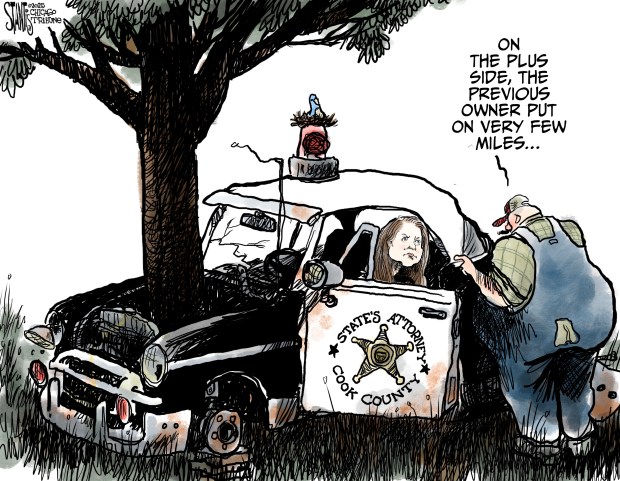Mayor Brandon Johnson told the public that if the City Council doesn’t give him his $300 million property tax increase, he’ll cut 2,473 police and 643 firefighters and paramedics and more city employees.
The mayor has presented his budget as a choice between the second-largest property tax increase in city history or draconian cuts — but this paints a false illusion. The size of the deficit guarantees he’ll reduce unfilled city positions, mostly in police and fire, just as he recently delayed starting the new police cadet class.
Johnson not only broke his campaign promise not to raise property taxes; also, he betrayed that vow while doing the bidding of the CTU, his former employer and chief backer. He picked his besties at the CTU over city taxpayers and other unions, especially police and fire, by most recently sending a windfall of a record $300 million in tax increment financing to the schools without reducing an equal amount of the city’s school subsidies, which would have allowed him to avoid the city property tax increase.
Why is the mayor’s support of the CTU important to note? Because Chicago Public Schools consumes more than half of all property taxes. Schools spend close to $30,000 per student, and the most recent CTU contract raised teacher salaries. Now, the teachers union wants even larger pay increases — 9% a year over four years — and even more CTU member school staff.
After Gov. JB Pritzker rebuffed the union’s demands for $1 billion more in state funding for CPS, the school board will likely raise property taxes to the max and hope to raid the city’s TIF program for even more than the mayor’s 2025 proposed budget recommends. As the City Council considers the mayor’s budget, it is imperative that aldermen likewise examine the school’s budget and their spending priorities. Both budgets are intertwined.
The fact remains that CPS is among the best-funded large school systems in the nation. It is also one of the worst-performing school districts. While the CTU demands more from taxpayers, it is working to strengthen its school monopoly by eliminating competition, including from public charter schools and selective enrollment schools.
The City Council would do well to look at balancing its budget and addressing the city’s long-term financial needs by bringing accountability to CPS’ budget and moving to end the city’s massive school district subsidies. This can be done by doing the following:
- The new CTU contract must be tied to available revenues and must be accompanied by zero-based budgeting. After a previous contract that saw increases in pay and added staff, holding the line is reasonable.
- Break up and decentralize the district while providing elected Local School Councils and school principals autonomy to determine the most effective use of school financial resources and staffing and to select their preferred school model.
- Return the district to pre-COVID-19 staffing levels with priority given to eliminating non-school-based positions. This would still leave the district one employee for every eight students while minimizing the impact on local school staffing levels.
- Close or consolidate near-empty schools and lease closed or underenrolled schools to public charters. This would not only save the district more than $100 million in operating costs but also would generate tens of millions in rental fees.
- Expand public school choice, which would increase state and federal aid. In other words, expand less-expensive, high-performing public charter and magnet schools.
- Take advantage of the future TIF windfall now by using the school district’s portion of property taxes from TIF districts to help address the district’s capital needs without diverting school operating funds or raising property taxes.
- Prioritize state funding for bringing Chicago teachers pensions into parity with teachers statewide. Pritzker could incentivize city and school district leaders to embrace fiscal responsibility by bringing long-overdue equity to Chicago teacher pension funding without having to provide more funding for downstate districts.
I estimate that these actions will enable the school district to balance its budget and the city to reduce its subsidies not related to TIF funds by $850 million.
While these actions would address the city-schools budget crisis, they must be accompanied by real financial reforms that would ensure the city is maximizing its return on investments, that real zero-based budgeting becomes the norm and that the budget process has full transparency with independent analysis and oversight.
The CTU and CPS administration will support few of these initiatives, as the administration wants to sustain its bureaucracy and maintain control over school resources, and CTU leaders seek to protect and expand union membership and increase member benefits while limiting accountability and competition. Both are oppositions to be overcome, if the city and schools budgets are to be balanced without punishing taxpayers with massive tax hikes or draconian service cuts.
Paul Vallas is an adviser for the Illinois Policy Institute. He ran for Chicago mayor in 2023 and in 2019 and was previously budget director for the city and CEO of Chicago Public Schools.
Submit a letter, of no more than 400 words, to the editor here or email letters@chicagotribune.com.



